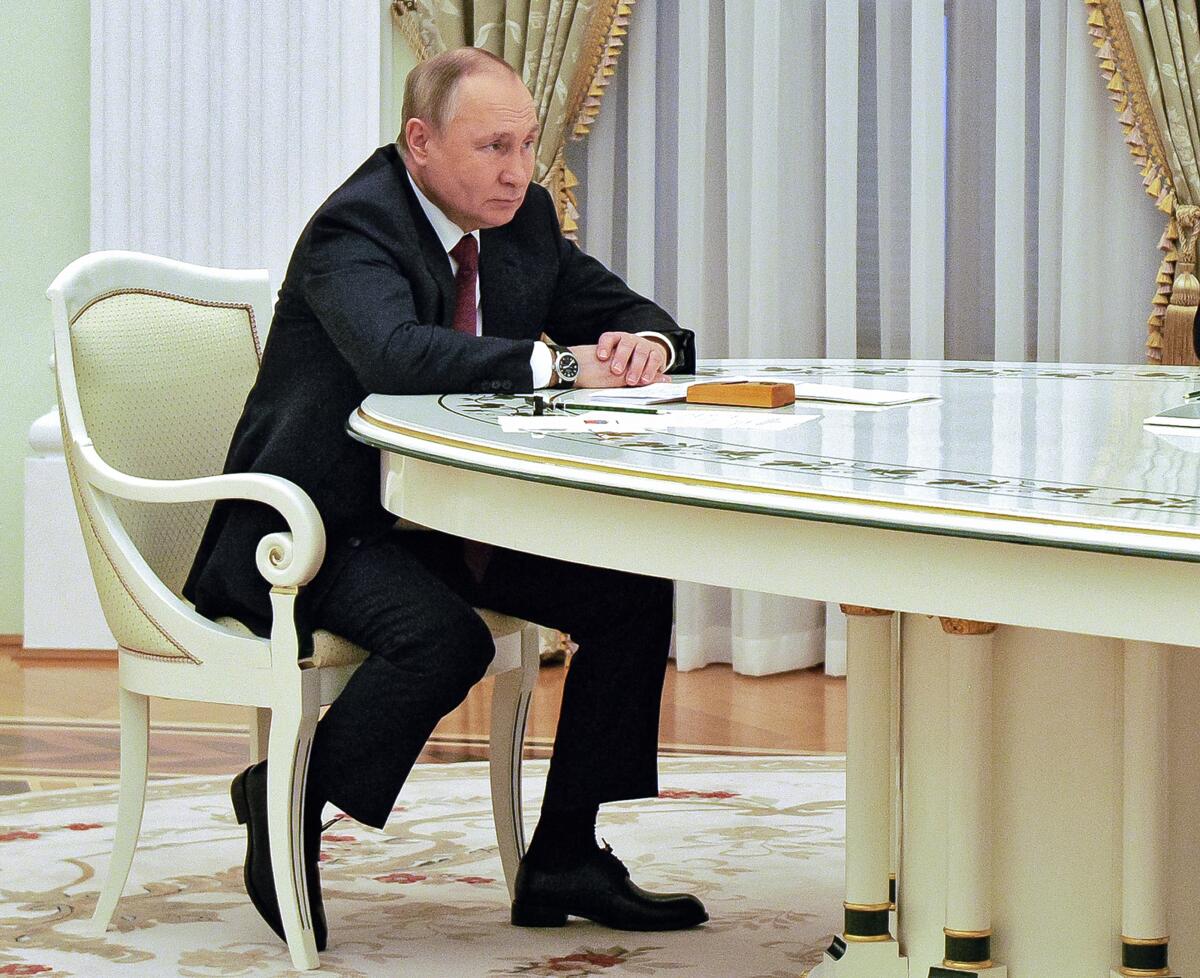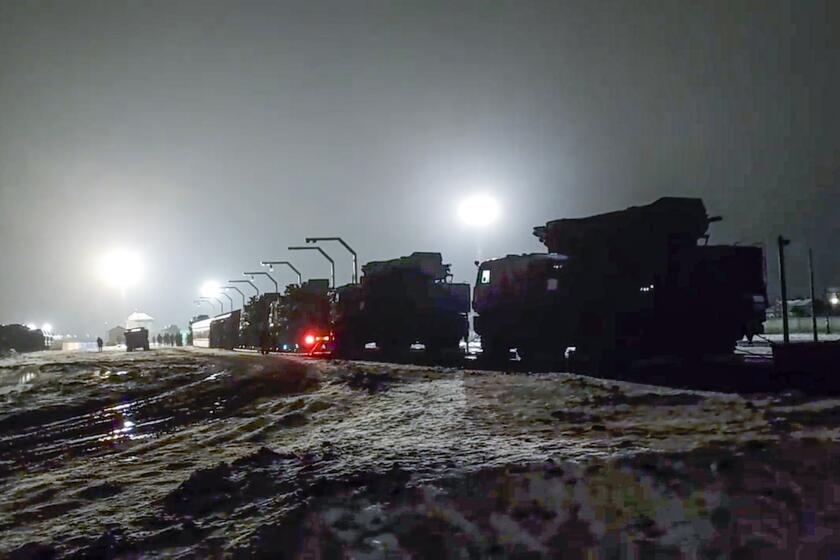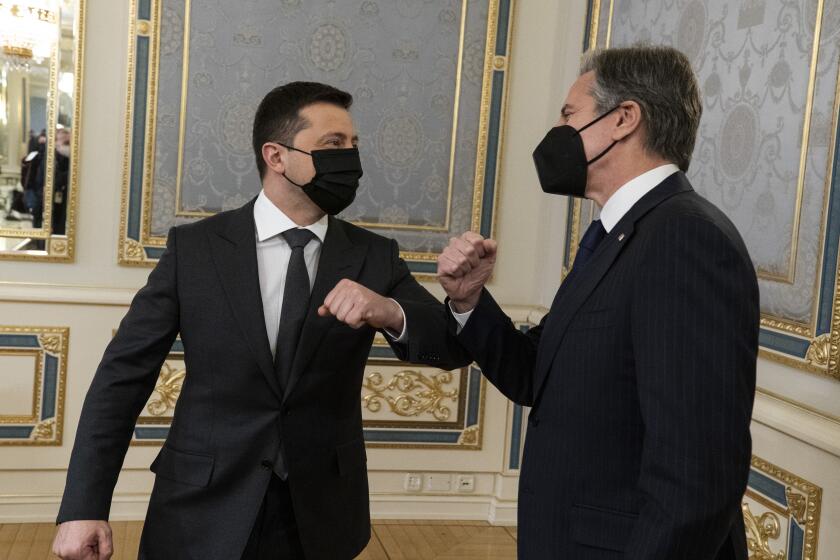Putin offers more talks with West to defuse Ukraine tensions

- Share via
MOSCOW — Russian President Vladimir Putin said Tuesday that the U.S. and its allies have ignored Russia’s top security demands but added that Moscow remains open to more talks with the West on easing soaring tensions over Ukraine.
Putin argued that it’s possible to negotiate an end to the standoff if interests of all parties, including Russia’s security concerns, are taken into account.
“I hope that we will eventually find a solution, although we realize that it’s not going to be easy,” Putin said amid a continuing buildup of an estimated 100,000 Russian troops near Ukraine that fueled Western fear of an invasion.
Russia has denied having an intention to attack its neighbor, but talks between Russia and the West have so far failed to yield any progress.
Washington and its allies have rejected Moscow’s demand for a halt to NATO’s expansion to Ukraine and other ex-Soviet nations, a freeze on the deployment of weapons there and a rollback of alliance forces from Eastern Europe, describing them as nonstarters. They emphasized that Ukraine, like any other nation, has the right to choose alliances.
The U.S. and its NATO allies must demonstrate to Vladimir Putin that Russia will pay a high price if the troops massed at the border invade Ukraine.
The Russian leader countered that argument by noting that the Western allies’ refusal to meet Russia’s demands violates their obligations on integrity of security for all nations. He warned that Ukraine’s accession to NATO could lead to a situation where Ukrainian authorities launch a military action to reclaim control over Crimea or areas controlled by Russia-backed separatists in the country’s east.
“Imagine that Ukraine becomes a NATO member and launches those military operations,” Putin said. “Should we fight NATO then? Has anyone thought about it?”
Russia annexed Ukraine’s Crimean Peninsula in 2014 following the ouster of the country’s Moscow-friendly president and later threw its weight behind rebels in Ukraine’s eastern industrial heartland, triggering a conflict that has killed more than 14,000.
Speaking after talks with Hungarian Prime Minister Viktor Orban, who forged close ties with Moscow even though his country is a member of NATO, Putin noted that it’s still possible to negotiate a settlement that would take every party’s concerns into account.
“We need to find a way to ensure interests and security of all parties, including Ukraine, European nations and Russia,” Putin said, emphasizing that the West needs to treat Russian proposals seriously to make progress.
The Russian leader argued that NATO’s open-door policy doesn’t oblige the alliance to offer membership to Ukraine, suggesting that the alliance could tell Ukraine that it can’t join “due to earlier international obligations.”
He said that French President Emmanuel Macron may soon visit Moscow as part of renewed diplomatic efforts following their call on Monday.
In a bid to exert pressure on the West, Russian Foreign Minister Sergey Lavrov sent letters to the U.S. and other Western counterparts pointing out their past obligations signed by all members of the Organization for Security and Cooperation in Europe, a top transatlantic security grouping.
Russia has argued that NATO’s expansion eastward has hurt Russia’s security, violating the principle of “indivisibility of security” endorsed by the OSCE in 1999 and 2010.
Putin charged that the West has “conned” Russia by reneging on its promises in the early 1990s that NATO would not expand eastward. He argued that the U.S. and its allies have ignored the principle that the security of one nation should not be strengthened at the expense of others, while insisting on every nation’s right to choose alliances.
Lavrov made the same argument in a phone call with U.S. Secretary of State Antony Blinken, saying that he warned that Moscow will not allow Washington to “hush it up.”
Blinken, meanwhile, emphasized “the U.S. willingness, bilaterally and together with Allies and partners, to continue a substantive exchange with Russia on mutual security concerns.”
State Department spokesman Ned Price noted that Blinken also “further reiterated the U.S. commitment to Ukraine’s sovereignty and territorial integrity, as well as the right of all countries to determine their own foreign policy and alliances.”
Blinken “urged immediate Russian de-escalation and the withdrawal of troops and equipment from Ukraine’s borders,” Price said. He reaffirmed that “further invasion of Ukraine would be met with swift and severe consequences and urged Russia to pursue a diplomatic path.”
Senior State Department officials described the call as professional and “fairly candid,” noting that Lavrov restated Russia’s insistence that it has no plans to invade Ukraine and Blinken replied that if Putin didn’t really intend to invade Ukraine, Russia should withdraw its troops. The top diplomats agreed that the next step would be for Russia to submit its response to the U.S. and for the sides to speak again.
Shortly after speaking to Lavrov, Blinken convened a conference call with the secretary general of NATO, the EU foreign policy chief and the chairman-in-office of the OSCE as part of efforts to ensure that the allies are engaged in any further contacts with Russia.
Continuing high-level diplomacy, British Prime Minister Boris Johnson visited Kyiv for scheduled talks with Ukrainian President Volodymyr Zelensky.
Addressing Zelensky, he noted that “more than 100,000 Russian troops are gathering on your border in perhaps the biggest demonstration of hostility toward Ukraine in our lifetimes.”
Western powers act as though war with Russia is inevitable, but Volodymyr Zelensky remains a voice of reason.
Johnson said the U.K. has a package of measures including sanctions ready to go “the moment the first Russian toecap crosses further into Ukrainian territory.”
“It is vital that Russia steps back and chooses a path of diplomacy and I believe that is still possible,” Johnson said. “We are keen to engage in dialogue, of course we are. But we have the sanctions ready.”
He said he would have a call with Putin tomorrow, noting that the Russian leader was trying to “impose a new Yalta, new zones of influence” in a reference to the 1945 deal between the allied powers. “And it would not just be Ukraine that was drawn back into the Russian sphere of influence,” Johnson added.
Asked if the U.K. was exaggerating the threat from Russia, Johnson said: “That is not the intelligence we are seeing. This is a clear and present danger.”
Earlier Tuesday, visiting Polish Prime Minister Mateusz Morawiecki promised to deliver more weapons to Ukraine, including portable air defense systems, drones, mortars and ammunition, noting that Russia’s neighbors feel like they are living “next to a volcano.”
The Ukrainian president signed a decree on Tuesday expanding the country’s army by 100,000 troops, bringing the total number to 350,000 in the next three years, and raising army wages. The decree ended conscription starting from Jan. 1, 2024, and outlined plans to hire 100,000 troops over the next three years.
___
Lee reported from Washington. Associated Press writers Yuras Karmanau in Kyiv, Ukraine, Jill Lawless in London, Dasha Litvinova in Moscow and Justin Spike in Budapest, Hungary, contributed to this report.
More to Read
Sign up for Essential California
The most important California stories and recommendations in your inbox every morning.
You may occasionally receive promotional content from the Los Angeles Times.












